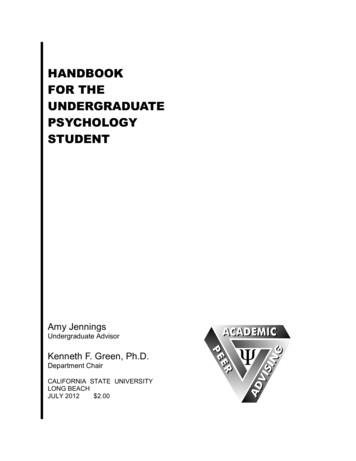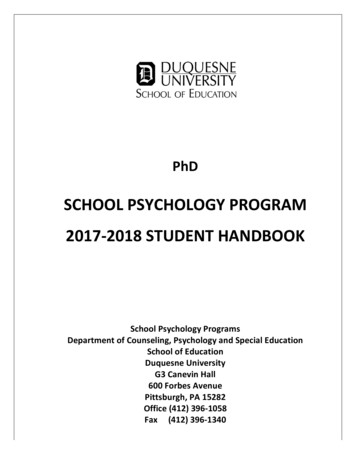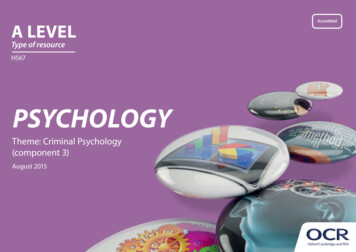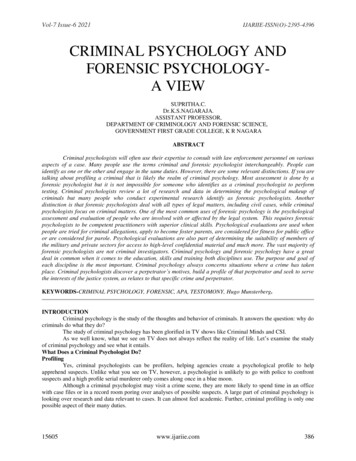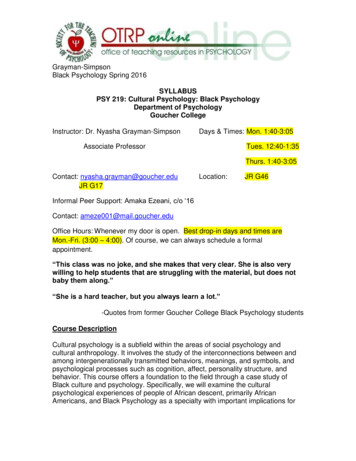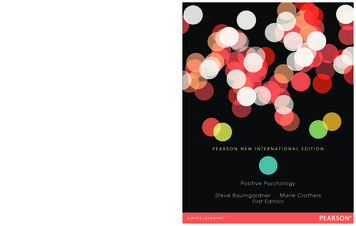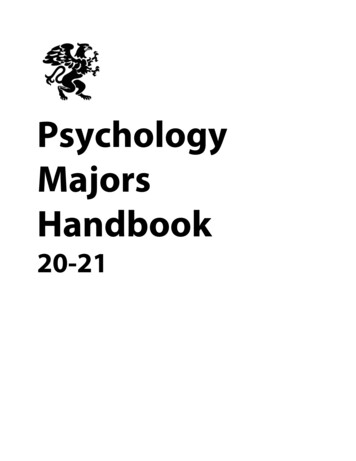
Transcription
PsychologyMajorsHandbook20-21
TABLE OF CONTENTSPSYCHOLOGY AT REED . 2PSYCHOLOGY FACULTY AND STAFF . 3COMMUNICATIONS REGARDING DEPARTMENTAL EVENTS . 4WEB RESOURCES FOR PSYCHOLOGY MAJORS . 4DECLARING A MAJOR . 4REQUIREMENTS FOR A PSYCHOLOGY MAJOR. 5THE JUNIOR QUALIFYING EXAMINATION. 6THE SENIOR YEAR . 7Thesis . 7Thesis Poster Session. 9Oral Examination . 9GRADUATE SCHOOLS AND EMPLOYMENT IN PSYCHOLOGY . 9Internship and Employment Opportunities . 11The Job Search . 11Graduate Study. 11The Graduate Record Exam . 12Application Timeline and Process . 12Graduate Fellowship Programs . 12Letters of Recommendation . 12Preparing for Your Career and for Graduate School . 13Appendix A: Talks Presented by Reed Psychology Students and FacultyWithin the Last 5 Years at Professional Meetings and Conferences . 14Appendix B: Publications Authored by Reed College Students andFaculty Within the Last 10 Years . 21Appendix C: A Representative List of Recent Senior Thesis Topics. 27
HANDBOOK FOR PSYCHOLOGY MAJORSPSYCHOLOGY AT REEDThe psychology program contributes to the liberal arts education of Reed students by emphasizing theapplication of empirical methods to the study of cognitive, affective, social, and behavioral processes. Studentsare exposed to the science of the mind, brain, and behavior. They are asked to engage in library and “handson” research projects, and are given many opportunities to improve their ability to read and evaluate researcharticles, to write, and to present materials orally.Students choose courses in psychology for a variety of reasons. Some are interested in careers in clinicalwork, psychological research, or teaching. Many take psychology courses seeking to expand their knowledge ofthe behavioral, cognitive, biological, or social sciences in general. Applying the scientific method to the study ofpsychology provides a solid analytic background for meeting each of these objectives.Majors choosing a career in psychology often go on to graduate school, as teaching, research, and mostclinical work require an advanced degree. Graduate school programs in every specialty in psychology favorapplicants who have a broad, research-oriented background.Although we expect majors to gain a broad overview and understanding of psychology, we do not wantstudents to concentrate exclusively on psychology courses. In fact, we believe that the study of psychology oftenbenefits from simultaneous study of related disciplines. We require 11 units in psychology (including the 2-unitsenior thesis), but also require six units in an allied field supplementing and enriching the student’s work inpsychology. (See REQUIREMENTS FOR A PSYCHOLOGY MAJOR for additional information).2
PSYCHOLOGY FACULTY AND INTERESTSKRISTEN G. ANDERSONDevelopmental psychopathology, addictive behaviors, women’s health, clinical psychologyGLENN BAKERSocial psychology, social cognition judgment, decision-makingENRIQUETA CANSECO-GONZALEZPsycholinguistics, neuropsychology, cognitive neuroscience, bilingualismCRYSTAL CARRBehavioral neuroscience, drugs of abuse, translational methodsJENNIFER CORPUSDevelopmental psychology, academic motivationPAUL J. CURRIE (on sabbatical 2020-21)Neuroscience, neuropharmacology, appetitive behavior, drug-receptor interactionsTIMOTHY HACKENBERG (Department Chair)Behavior analysis, comparative cognition, behavioral economicsLEIA HARPER (Scholar in Residence)Health psychology, social determinants of health and health disparities, health informatics andcomputational methodsKEVIN HOLMESCognitive science, language and thought, categorization, abstract conceptsALLEN NEURINGER (Emeritus)Behavioral variability, volition, self-experimentation, self-controlKATHRYN OLESONSocial psychology, interpersonal perception and relations, social cognitionMICHAEL PITTSCognitive neuroscience, sensation and perception, attention and consciousnessThe psychology professors at Reed are involved in a wide range of research areas, and this broad viewof psychology is reflected in our courses. Refer to the Reed College Catalog for a list of courses and theirdescriptions at http://www.reed.edu/catalog/programs/dept majors/psy.html.Psychology professors have active research programs that frequently involve students. See AppendicesA & B for recent presentations and publications co-authored by Reed students.PSYCHOLOGY STAFFJOAN MEYERFaculty Administrative CoordinatorSABRINA SCHOERLUCKEDepartmental AssociateGREG WILKINSONAnimal Colony Lab Technician3
COMMUNICATIONS REGARDING DEPARTMENTAL EVENTSWe maintain an email list through which we post bulletins regarding departmental events, interestinglocal events, and job and internship opportunities. We strongly urge all psych majors to get their names on thislist! To subscribe to the Psych email list, go to academic.reed.edu/psychology and click on the “Join the PsychEmail List” link.WEB RESOURCES FOR PSYCHOLOGY MAJORSBe sure to bookmark the Psychology Department’s website: http://academic.reed.edu/psychology.You will find links to current events and departmental news, faculty CVs, and psychology links and resources.The American Psychological Association maintains a website with many useful resources for psychologystudents: http://www.apa.org/.DECLARING A MAJORStudents must declare a major by the end of their sophomore year. Students are granted upper-classstatus once they have declared a major and completed at least thirteen units of course work at Reed orelsewhere. Psychology students must complete both the Declaration of Major Form and the Declaration ofAllied Field Form, which can be found on the Registrar’s Office website:http://www.reed.edu/registrar/forms.html. These forms must be signed by a faculty member in psychologyand returned to the Registrar (Eliot 311).4
REQUIREMENTS FOR A PSYCHOLOGY MAJOR1. At least 11 units in psychology, including:a. Foundations in Psychological Science (Psychology 101).b. Four Psychological Science Labs (201-209).c. Four of the following eight courses: Social Psychology (322), Behavioral Neuroscience (333),Psychopathology (351), Developmental Psychology (361), Cognitive Processes (366), Learning(373), Sensation & Perception (381), Psycholinguistics (393).d. Research Design and Data Analysis (348).e. Thesis (470).All students must take the junior qualifying examination before entering the senior year. Ordinarily, thequalifying exam is taken in the second semester of the student’s junior year. Students are eligible to takethe qualifying exam only if they have already completed five units in psychology, at least two of whichare core courses (listed in “c” above).2. Six units in an allied field selected from the fields below, approved by the adviser when the studentdeclares the major. Cross-listed courses taught by psychology faculty may not be used to meet therequirements of an allied field.a. Arts and Literature—six units in the following allied disciplines, to include at least two units fromeach of two separate disciplines: art, creative writing, dance, humanities (Humanities 220, or twounits from Humanities 211, 212, 231, and 232), music, literature, theatre. No more than fourapplied courses (i.e., studio art, creative writing, applied courses in dance and music, acting anddesign courses in theatre) may be counted.b. Biological, Physical, and Computational Sciences—six units in the following disciplines, toinclude at least two units from each of two separate disciplines: biology, chemistry, physics,mathematics, economics.c. Cognitive Science—six units in the following disciplines, to include at least two units from each oftwo separate disciplines: philosophy, linguistics, biology, anthropology, computer science coursesin mathematics.d. Cross-Cultural Studies—six units to include a foreign language at the 200 level plus fouradditional units. Students must complete six units even if the 200-level language requirement ismet by placement exam. Students should select from courses focusing on ethnic or internationalhistory or social sciences, 300-level courses with ethnic or international focus in literature andlanguages, Humanities 231–232, religion, a second foreign language at the 200 level (cannot bemet by placement exam).e. History and Social Sciences—six units in the following disciplines, to include at least two unitsfrom each of two separate disciplines: anthropology, economics, history, humanities (Humanities220, or two units from Humanities 211, 212, 231, and 232), political science, religion, sociology.5
THE JUNIOR QUALIFYING EXAMINATIONStudents taking the Junior Qualifying Examination in psychology are asked to summarize and evaluatea research article, and to design research that will answer a question suggested by the research article. The goalsof the qualifying exam are varied: to evaluate a student’s mastery of psychology; to serve as a diagnostic aid inidentifying weaknesses in student preparation for advanced study or thesis work in psychology; to assist studentsin unifying their knowledge of a major field; and to assist the department in assessing the effectiveness of our ownprogram.All students must take the Junior Qualifying Examination before entering their senior year. Ordinarily,the exam is taken in the second semester of the student’s junior year. Students are eligible to take the exam inour department only if they have already completed five units in Psychology, at least two of which are corecourses (listed in “1.c” above).The Junior Qualifying Examination is administered during an announced period in the spring semester,and during the second quarter of the fall semester for students who will begin a mid-year thesis. Each exam isassigned to two faculty readers who initially grade the exam separately according to the learning competenciesdescribed in the table below. If the student is asked to resubmit the Qual, the revision must be turned in beforethe end of the same semester in which the Qual was taken. A student must have passed the Qual beforeregistering for the senior thesis. Note: Interdisciplinary programs generally require taking a Qual from eachparticipating discipline or a single special qualifying examination prepared by the two departments.Competency AreaKnowledge Base inPsychologyResearch Skills &Critical ThinkingSpecific Learning ObjectiveDemonstrate broad understanding of subject area and working knowledge ofappropriate terminologyIdentify alternative interpretations in target articlesApply ethical standards to evaluate psychological science and practiceDeconstruct and evaluate an empirical articleUnderstand statistical results in target articleGenerate an innovative and integrative extension to target articleDemonstrate ability to develop cogent, testable hypothesesDemonstrate an ability to formulate logical research designsApply ethical standards to proposed researchCommunication:Written ExpressionArticulate appropriate comparisons based on designIdentify strengths & weaknesses in proposed designArticulate generalizability of findings for diverse set of populations (human ornon-human)Revise/resubmits: respond appropriately to constructive feedbackDemonstrate proofreadingRefine clear & concise scientific writing styleCritically analyze existing literaturePresent arguments using a logical structureConvey coherent ideas to non-expertsStrike an appropriate balance between too much and too little detailDemonstrate application of APA style or scientific equivalent6
THE SENIOR YEARThesisGetting StartedWe strongly encourage students to carry out an empirical research project for the senior thesis.Occasionally, students petition the Department to do a library (non-empirical) thesis, providing a clear rationale.Non-empirical theses may include, for example, a library research review of previous studies in a difficult-toresearch area or a theoretical analysis of a major psychological problem. In all cases, the library thesis mustinclude a detailed empirical research proposal designed to clarify issues raised in the thesis.There are several ways to identify a feasible research topic. Many psychology majors will have alreadybegun an interesting line of research as part of a course project. It is a good idea to establish and maintain a fileof interesting research questions starting with your first psychology course. Online databases (such as PsycINFO)can be perused to find an interest area, names of researchers in the particular field, and periodicals that oftenpublish articles about the particular topic. Psychology periodicals in the Reed Library can also stimulate goodresearch ideas. Also consult the volumes of The Annual Review of Psychology. Chapters in the Annual Reviewsummarize and evaluate significant research of the preceding year on a wide range of current topics inpsychology and provide excellent suggestions for next steps in research and very good references.Finally, we are glad to discuss ideas with students who have completed the Junior Qual and aresearching for a topic. It is frequently possible to collaborate with one or more of us in our ongoing research aspart of the Senior Thesis. We may also be able to help a student form a collaborative relationship with alaboratory or research program at another facility in Portland (e.g., at OHSU, the Primate Center, or in aclinical setting).For some titles of recent Reed Senior Theses, see Appendix C.During the 1st week of the fall semester, we hold a meeting with seniors to discuss the process ofchoosing a thesis advisor, thesis deadlines, and tips for writing a senior thesis. It is a good idea for students totalk with faculty about possible senior thesis topics at the end of the junior year, during orientation week, orduring the 1st week of classes. Sometime between the end of the 1st and 2nd week of classes, we will ask eachsenior to submit in writing a 1st, 2nd, and 3rd choice for both thesis topic and advisor. We do our best to provideeach senior with his or her 1st choice of advisor, but this is sometimes not possible (e.g., if too many studentsrequest a single advisor). In all cases, though, we are committed to providing each senior with an advisor able tosupervise research in the domain in which the senior will be working.DeadlinesEarly in the senior year, usually the first Wednesday in October, each student submits a detailed thesisproposal to the Chair of the Division, via Mary Sullivan, the Division’s Administrative Coordinator, and to thethesis advisor (this is a deadline imposed by the Division). The proposal should include:a.b.c.d.e.f.g.statement of the research problemdesign of the investigationnecessary equipment, facilities, and subjects, including a preliminary budgetdata to be collecteddata analysis to be employedbrief annotated bibliographycalendar setting projected deadlines for completing each portion of the thesis7
Most senior thesis projects will require review and approval by either Reed’s Institutional Review Boardor by the Animal Care Committee. Although review procedures vary from year to year, the Institutional ReviewBoard (http://web.reed.edu/irb) has a series of deadlines and return dates for research proposals. Studentsshould consult with their advisor as soon as possible about whether a project will require review. Seniors are alsoencouraged to talk with their thesis advisers about opportunities for additional funding for thesis projects.The Psychology Department also requires that a draft of the first chapter of the thesis be submitted tothe thesis advisor by the last day of classes of the first semester. Requirements for this chapter should bediscussed with the thesis advisor.A first draft of the completed thesis, including abstract, figures, statistics where appropriate, andbibliography must be submitted four weeks before the college-wide deadline for the final manuscript to theChair of the Division, via Mary Sullivan, the Division’s Administrative Coordinator, and to the thesis advisor.These drafts are normally returned within one week with suggestions for revision. A senior in our Division notmeeting this first draft deadline may not graduate at the end of the semester.Writing the ThesisIt is not unusual to encounter interrelated problems in undertaking thesis work: 1) time budgeting anddesigning a manageable thesis that can be completed in two semesters; and 2) making efficient use of libraryresources. A common error is to spend too long at the beginning of the year gathering references instead ofbeginning the research project itself. Don't forget that this is not a doctoral dissertation, and that researchalways takes much longer than expected.Psychology theses are written in the general format of journal articles as established by the AmericanPsychological Association. There must be an Abstract, Introduction and Review of the Literature, a Methodschapter (Participants, Materials, Procedure), Results, and Discussion. The latter section should includeconsideration of sources of error and limitations of the research, suggestions for future research, and aconclusion. Consult the Publication Manual of the American Psychological Association and the “Guide toWriting Empirical Research Reports” usually distributed in Psy 101 but also available from Joan Meyer inPsy 116. A website with links to guides to APA style is: http://www.apastyle.org/. Students may also wantto ask faculty advisors to suggest previous theses to use as examples.In writing a thesis, students should remember that a non-psychologist will be on the Orals Board, andshould therefore define technical terms carefully.There are strict formatting requirements for the thesis document. These are described in a documentdistributed to seniors by the Registrar's Office, and an electronic “thesis template” is available athttp://web.reed.edu/cis/help/thesis. Students are strongly urged to write their thesis within the template fromthe start, rather than taking the more difficult step of ‘converting’ the thesis into the template’s form later on.The College requires seniors to take at least 6 units during the two semesters of their final year and nofewer than 2 units in either semester. The best plan is 4-2 or 3-3. It is advisable to take a relatively light courseload when writing a thesis. It is also a good idea to plan ahead and finish Departmental and CollegeDistribution requirements before the senior year so that, as a thesis student, you are free to take electives inother fields.8
Thesis Poster SessionSoon after the thesis first draft deadline (usually the following Friday), we host a Senior Thesis PosterSession. Poster formats are informal, including, for example: a statement of purpose and summary of expectedfindings or conclusions; a diagram showing stimulus displays, testing apparatus, or a copy of a questionnaire; afigure displaying preliminary results. The goal is to provide others an idea of what the students have beenworking on to promote conversation. We understand that theses will be at various stages of completion, and wedo not require elaborate mountings and artwork. Students report the poster session to be a helpful way toorganize their thinking about their thesis in preparation for the oral examination.Oral ExaminationThe Oral Examination focuses on the thesis, but is not necessarily confined to it. It normally occursduring Reading Week for a period of 1.5 hours. The examining committee usually consists of three or fourmembers: the thesis advisor, usually two other members of the Psychology Department, and one other facultymember from outside the Division of Philosophy, Religion, Psychology, and Linguistics. Departmental membersof the Orals Board are selected by the faculty, although student preferences can be voiced through their advisor.The “outside” Board member is selected and invited by the candidate. The schedule of psychology Orals isposted approximately three weeks before the end of the semester to provide adequate time for students to invitetheir “outside member.”With the approval of the faculty advisor, the candidate may also invite an individual from off-campus(for example, a clinical professional with whom the student has worked). When the participation of such anindividual is important, the candidate should obtain the schedule of the off-campus individual before theDepartment schedules Orals and communicate the schedule to the faculty advisor. This individual does notreplace the “outside member” of the Orals Board. Also, with the approval of the faculty advisor, candidates mayinvite one or two student guests, especially psychology juniors, who appreciate the chance to see what a seniorOral in psychology is really like.Often, candidates begin the Oral Exam by stating how they became interested in the topic and thensummarize the thesis project. The student may be asked questions both during and after this summary.Members of the Orals Board may also ask questions on any aspect of the student’s academic experience atReed.At the end of the examination, the student is asked to leave the room for a brief period so that theBoard can discuss the thesis and the examination. The student is then informed by the Board the results of its“deliberations.” The student makes whatever changes or corrections are requested in the thesis as a result of theOral Examination, and the advisor confirms these and signs the thesis copies before they are bound. Twobound copies go to the library and one to the advisor. Binding can be done by the college’s printing office. Anelectronic version goes to Joan for the departmental collection and in case the student needs a copy to be sentsomewhere electronically in the future. We strongly encourage students to submit their theses to the ReedLibrary Electronic Thesis Archive at http://library.reed.edu/etheses/.Some apprehensiveness about the thesis Orals is unavoidable; however, most seniors find the Orals tobe stimulating and enjoyable (at least after the first few minutes). Rarely does a candidate fail the OralExamination.9
Thesis performance is evaluated relative to the criteria outlined in the table of competencies below.Whereas some aspects of performance are accessible to all members of the committee (e.g., oral and writtencommunication), other aspects are accessible to the adviser alone (e.g., working collaboratively, openness tofeedback). The thesis grade is therefore ultimately the decision of the adviser, but with noteworthy input fromcommittee members, and in particular, the two other psychologists on the committee. In an attempt to bettercalibrate grades across advisers and areas of research, the psychology faculty discuss thesis grades at the finaldepartment meeting of the spring term.Competency AreaKnowledge Base inPsychologyResearch Skills &Critical ThinkingCommunication:Written ExpressionCommunication:Oral ExpressionProcessSpecific Learning ObjectiveDemonstrate expertise in subject areaUnderstand broader context/application of own researchMake appropriate connections between own research and different areas withinpsychologyClearly articulate implications of psychological science for diverse groups ofindividuals and speciesDemonstrate knowledge of basic translational approaches (basic - applied)Demonstrate innovative and integrative extension of previous literatureAttention to detail in design and implementationApply ethical standards to researchApply technical and bench skills to research projectDemonstrate time management and organizationConduct appropriate data analysis (quantitative/qualitative)Critically evaluate own research (strengths/limitations)Master clear & concise scientific writing styleExhibit correct use of technical terminology (theoretical, statistical)Master critical analysis of existing literatureDemonstrate logical argument structureCommunicate results in coherent manner to non-expertsStrike an appropriate balance between too much and too little detailRespond appropriately to feedbackMaster APA style and/or scientific equivalentDemonstrate ability to organize and present argumentsDemonstrate understanding of questions and feedbackEngage in collegial debate and discussionDemonstrate organizational skills & time managementDemonstrate growth in skills necessary for project completionWork collaboratively with mentor to develop research planShow openness and responsiveness to mentor feedback10
GRADUATE SCHOOLS AND EMPLOYMENT IN PSYCHOLOGYWe hold a meeting for seniors several weeks into the fall semester concerning graduate schools andcareer options. The Center for Life Beyond Reed is an excellent source of information concerning careerpossibilities. The office maintains a library that contains a wide array of career and internship directories as wellas national job listings.Internship and Employment OpportunitiesFor psychology majors who have not yet graduated (or who plan to take time off before going tograduate school) there are many summer internships available that provide useful experience. Some offerstipends, some do not. Files and directories in the Center for Life Beyond Reed list a wide range ofopportunities. The websites of Professional Societies and of funding agencies such as the NSF and NIH oftenprovide links to summer internship information as well. Note that many of these opportunities are announcedvia the department’s email mailing list, and this is an important reason why we urge students to subscribe to thislist.With a B.A. in psychology, you are qualified for a number of job opportunities in the private and publicsector. Psychology-related jobs held by recent Reed alums include: teacher in a Montessori school; researchassistant at NIH; counselor in a group home for socially-emotionally impaired children; alcohol and drug abusecounselor; laboratory assistant at Oregon Health Sciences University; college admissions counselor; child careworker for children who have left home; and houseparent in a group home for single teenage parents. Nonpsychology-related positions include: computer programmer; political aide; English teacher overseas; andinsurance company employee.The Job SearchStudents should begin the job search process early! It is important that students alert the Center for LifeBeyond Reed staff when commencing career exploration so they can be informed about seminars andworkshops that will be of assistance. Also, a strong alumni network exists to support students and soon-to-begraduates in their job search strategies. Scheduling employment interviews with recruiters visiting campus isbeneficial as well.Students should periodically check the Psychology Department bulletin boards for announcements ofjob and fellowship opportunities. Fellowship and award materials can be found in the Center for Life BeyondReed office and on the Web.Graduate StudyStudents intending to go into psychology as a profession generally need graduate training. Other fieldsfor which psychology is a desirable background include social work, counseling, education, sociology,criminology, international relations, law, business administration, public administration, journalism, computeradministration & support, biology, neuroscience, public health, medicine, nursing. The emphasis onindependent research at Reed provides excellent preparation for graduate school.11
The Graduate Record ExamStudents wanting to attend graduate school should take the Graduate Record Exam (GRE) at the endof their junior year or early in the fall of their senior year. Complete information can be obtained from theCenter for Life Beyond Reed. We strongly recommend that students planning to take time off before applyingto graduate school take the GRE before leaving college, because students who do so usually do better.Application Timeline and ProcessStudents who plan to attend graduate school immediately after leaving Reed should spend time early inthe fall semester obtaining information and applications, and later in the semester should fill out and submit theapplication forms. A few schools have application deadlines in December; most are at the end of Decemberthrough the middle of January.There is no rule concerning how many programs students should apply to; however, they shouldconsider applying not only to preferred programs, but also to graduate programs that may be 2nd and 3rdchoices. The APA website provides a good set of links to graduate schools, as doeshttp://www.psychwww.com/index.html. Students can determine how competitive particular programs are bycomparing information in Graduate Study in Psychology (available for checkout from Joan Meyer in Psy 116)about applications/acceptance ratios, number of openings, and GPA requirements. The Center for LifeBeyond Reed also maintains an alumni volunteer d
REQUIREMENTS FOR A PSYCHOLOGY MAJOR 1. At least 11 units in psychology, including: a. Foundations in Psychological Science (Psychology 101). b. Four Psychological Science Labs (201-209). c. Four of the following eight courses: Social Psychology (322), Behavioral Neuroscience (333), Psychopathology (351), Developmental Psychology (361 .
